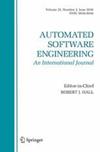Context-aware code summarization with multi-relational graph neural network
Abstract
Source code summaries are short natural language descriptions of code snippets that help developers better understand and maintain source code. There has been a surge of work on automatic code summarization to reduce the burden of writing summaries manually. However, contemporary approaches only leverage the information within the boundary of the method being summarized (i.e., local context), and ignore the broader context that could assist with code summarization. This paper explores two global contexts, namely intra-class and inter-class contexts, and proposes CoCoSUM: Context-Aware Code Summarization with Multi-Relational Graph Neural Network. CoCoSUM first incorporates class names as the intra-class context to generate the class semantic embeddings. Then, relevant Unified Modeling Language (UML) class diagrams are extracted as inter-class context and are encoded into the class relational embeddings using a novel Multi-Relational Graph Neural Network (MRGNN). Class semantic embeddings and class relational embeddings, together with the outputs from code token encoder and AST encoder, are passed to a decoder armed with a two-level attention mechanism to generate high-quality, context-aware code summaries. Experimental results show that CoCoSUM outperforms state-of-the-art methods and the global contexts adopted in CoCoSUM can also strengthen existing code summarization models. Our replication package is anonymously available at https://github.com/DeepSoftwareAnalytics/cocosum.


 求助内容:
求助内容: 应助结果提醒方式:
应助结果提醒方式:


